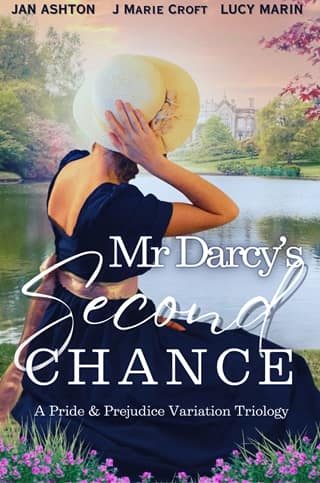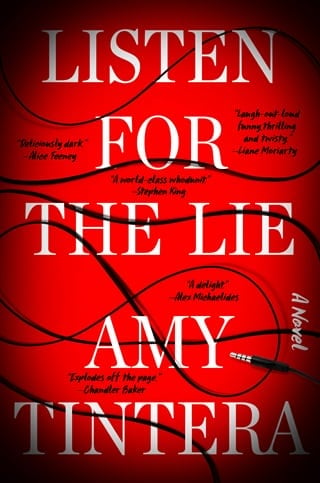Chapter 10
Ten
Rara Avis was a pretty prospect, but Anne could tell Miss Bennet thought it unworthy of extravagant praise.
A groom arrived to take charge of the equipage, and as the ladies stood at the bottom of the steps, Brinton rushed down them.
His white shirt was marred by dried dabs of yellow and blue paint in a larger splotch of scarlet. Black breeches, stockings, house slippers, and an unbuttoned, striped vermilion and chartreuse waistcoat completed his eccentric appearance. Good grief! With that tousled hair and those rolled up shirtsleeves, he looks like an unkempt beggar.
Arms stretched wide, Brinton approached. "Anne! How exceedingly good it is to see you."
Not bothering to conceal her astonishment at his déshabillé , Miss Bennet whispered to Anne, "Obviously, we were not expected."
"And Miss Elizabeth Bennet! I am overjoyed to welcome you to my home." Reaching for her hand, the master of Rara Avis bowed over it. An ebony curl, longer than fashionable, fell over one of his eyes. Graceful, paint-stained fingers brushed it back into some semblance of order before he placed Miss Bennet's hand upon his forearm and covered it with his own. She flinched, and Anne supposed the lady never before, even with gloved fingers, had touched a man's exposed skin.
"Do come in, ladies, and view my latest creation. Then we shall nibble on currant cakes, drink tea, chat, and have a pleasant afternoon. And," he said, smiling at Anne, "because I dearly love to dance, I now request, in advance, a set with each of you at my dear friend's ball."
Anne could tell Miss Bennet was taken aback by the gentleman's familiar manner. But I am certain there is so much kindliness in his reception she cannot help but be charmed.
Miss Bennet murmured, "We should not be here."
In less than ten minutes, as Anne expected, Brinton—being his customary, likeable self—had enchanted Miss Bennet.
I daresay she cannot help but succumb to his allure. But perhaps it is the other way round, judging by the way he has yet to remove his hand from where it rests upon hers. How terribly interesting. Yes, terribly so.
Having been energetic in promoting Rara Avis and its dashing owner during the drive thither, Anne suspected her efforts might have been, to some degree, overly zealous. A feeling, almost akin to envy, arose within her breast.
Balderdash! Although the society of so talented, so clever, and so jovial a gentleman gradually had become Anne's most exquisite pleasure, it was not as though she were in love with Brinton. She was certainly not jealous.
Trailing behind, she observed them, talking and laughing, winding through long passages and up several staircases. Every moment there, every turn about the place, seemed to supply Miss Bennet with a new delight. Anne remembered feeling that same sort of awe during her own early visits. The manor brimmed with exotic potted plants, songbirds in ornate cages, stained glass windows, Brinton's works of art, musical instruments, and curiosities from round the world.
"Just one more flight," Brinton said, "then we shall reach my garret."
Miss Bennet bestowed her delightful smile upon him. "Garret, sir? You paint a dismal image—a cold, wretched abode for an artist."
Earlier, she had complimented a few of his landscapes on display, but Miss Bennet had yet to hear him recite his verses or perform sweet, haunting, intricate melodies on the violin. It seemed to Anne that Laurence Brinton was the living embodiment of the extraordinary men of centuries past who had created masterpieces during the revival of learning. She, however, may have been biased.
"Here we are." He opened the door. Sunlight flooded the sky parlour, streaming through windows on three sides and in the roof.
Anne had been there only twice before. There were too many stairs for her liking, and she was panting, while Miss Bennet was scarcely out of breath. It must be all those walks she is so fond of taking.
The garret was warm, and sweat beaded on Anne's forehead until her mother's voice reminded her that ladies did not sweat; they perspired. As delicately as possible, she mopped her brow with a handkerchief.
Miss Bennet cried in delight upon seeing the pair of colourful popinjays upon their perch.
"Ah yes. Meet Squeak and Squawk." Brinton grimaced. "They were named by sailors who abducted them from La Isla de la Trinidad . Their previous owner—from whom I rescued them—kept those horrid names, and my lovelies were so accustomed to Squeak and Squawk that I had not the heart to change them."
He spoke to the parrots, and one of them made a loud, harsh reply of sorts. "During warm weather, these beauties reside in the aviary, but it is presently far too cold for my pets out there in the garden. What a beastly, cold spring we are having." Holding out his hand, he made kissing noises. One of the macaws—Anne did not know which—flapped its wings and flew over, landing on his wrist. Miss Bennet gently stroked the macaw's scarlet head while Brinton fed it some sort of nut.
Anne wrinkled her nose. He is talking to the bird in the same sickening manner Mrs Jenkinson uses when cooing at infants. Ugh. I could never utter such meaningless twaddle. Besides, I do not want children.
After setting the bird upon its perch, Brinton theatrically unveiled the oil painting he wanted the ladies to see. Anne's gasp was echoed by Miss Bennet's.
"That is me ," Anne cried, aghast, "holding Squeak…or Squawk. Heaven and earth, Brinton! What am I wearing ?" Ready to swoon, Anne fetched the sterling silver vinaigrette from her reticule, opened the lid, and deeply inhaled its pungent infusion of ammonia, vinegar, alcohol, and lemon oil. Her nose ran. Her eyes stung. Her sensibilities were aggrieved.
Sounding utterly bewildered, Brinton asked, "Anne, have I offended you?"
Good grief. The loveable muttonhead lives life without fear and without regard for others' judgments or criticisms. Anne knew that surrendering to society's expectations would prove downright dull, if not malignant, to Brinton.
"How could you portray me like that?" She glared at the portrait, then at him. "When did you paint that travesty?"
"I frequently make sketches of your face, Anne, you know that. I have shown them to you." Appearing somewhat dejected, he gripped a fistful of the shirt covering his chest. "Admittedly, I took certain liberties in depicting your form and mode of dress, but?—"
"Mode of dress? That gown is practically indecent!" Anne squeezed her eyes shut. "Paint over it, Brinton. Paint me a dark-hued velvet gown with some sleeves and a high neck."
Turning, she glared at Miss Bennet, for she had just heard a barely suppressed laugh. Her blushing face is a mask of gravity, but those expressive eyes betray her mirth.
Anne stamped her foot. "This is not amusing!"
"Tut, tut." Brinton patted Anne's shoulder, then turned to throw a sheet over the easel. "Such a pity. You often lament the dowdy fashions your mother insists you wear, so I thought you would be pleased with that portrait."
Anne knew how much he loved sharing his talents and happiness with others, and she regretted her angry outburst. "I promise I shall be pleased with it once you properly clothe me."
From the parrots' perch came squawks that sounded suspiciously like, "Heaven and earth, Brinton! What am I wearing ? Heaven and earth, Brinton! What am I wearing ?"
It was all too much. Anne had had enough. Enervated, she trudged over to the garret's sofa and collapsed amongst its colourful silk cushions. Hang this frailty of mine!
Thankfully, the outlandish clock on the cabinet informed her they had overstayed their welcome. Well, not really. I know Brinton would like us to remain, but the man has no sense of time. I doubt he even owns a pocket watch. He lives in, and strictly for, the moment.
But she could not risk her mother's wrath or, heaven forfend , Darcy's. And Mrs Collins would fret should her houseguest not arrive at the parsonage in a timely manner. Anne did not even want to think about the panic Mr Collins would be in should the daughter of his patroness be assumed missing.
"We must leave." Grabbing her reticule and stumbling down the staircases, Anne called for her pelisse and phaeton. Miss Bennet and Brinton slowly followed in her footsteps.
Calmer then, Anne reflected on their visit. If one blotted out the memory of a certain scandalous oil painting, she believed the brief call had served its purpose. Like Gilchrist, Brinton was a willing partner in their scheme. And never would she unscrupulously control or influence a friend.
Anne was growing rather fond of Elizabeth Bennet, and she hoped her new friend would not regret her involvement, albeit in a secondary role. She must not become truly enamoured of Brinton, for I would not like to be responsible for another person's heartbreak. I have anxious considerations enough as it is.
In a rush to return to Rosings, Anne had left her gloves at Rara Avis, and Miss Bennet insisted they take turns wearing hers. The shy sun had hidden itself behind clouds, and Anne, chilled to the marrow and craving her fireside and a bit of Mrs Jenkinson's incessant coddling, urged her ponies from a slow jog into a lively trot.
Stifling a sigh, she answered another of Miss Bennet's endless enquiries about Brinton. "He recently turned six and twenty, and before you ask, yes, he has an inheritance from his parents. After their deaths, he was raised by a wealthy great-uncle, the owner of Brinton Hall. When that gentleman died, my friend inherited his ancestral home and re-named it Rara Avis, which means rare bird. And he is a rare bird, indeed. Amiable, he is liked by almost everyone save my mother and Darcy who think he is an immature, selfish, and irresponsible young man who flits from one interest to another."
"Does he flit from one woman to another?"
Passing out of the woods into the park, Anne watched a robin tilt its head, listening for a worm in the thawing ground. Mimicking its sideways movement, she contrived an answer. "No doubt you have discerned that Brinton is an audacious flirt. Thus far he has shied away from marriage."
Best change that subject! "He has many friends, ones who understand him. He mingles with politicians and artists alike, including Byron. He does not, however, tolerate people who belittle him. He likes happy people and?—"
A rider approached at a gallop, and Anne pulled back on the reins. "Oh good grief! Is that Darcy ?"
 Fullepub
Fullepub 



